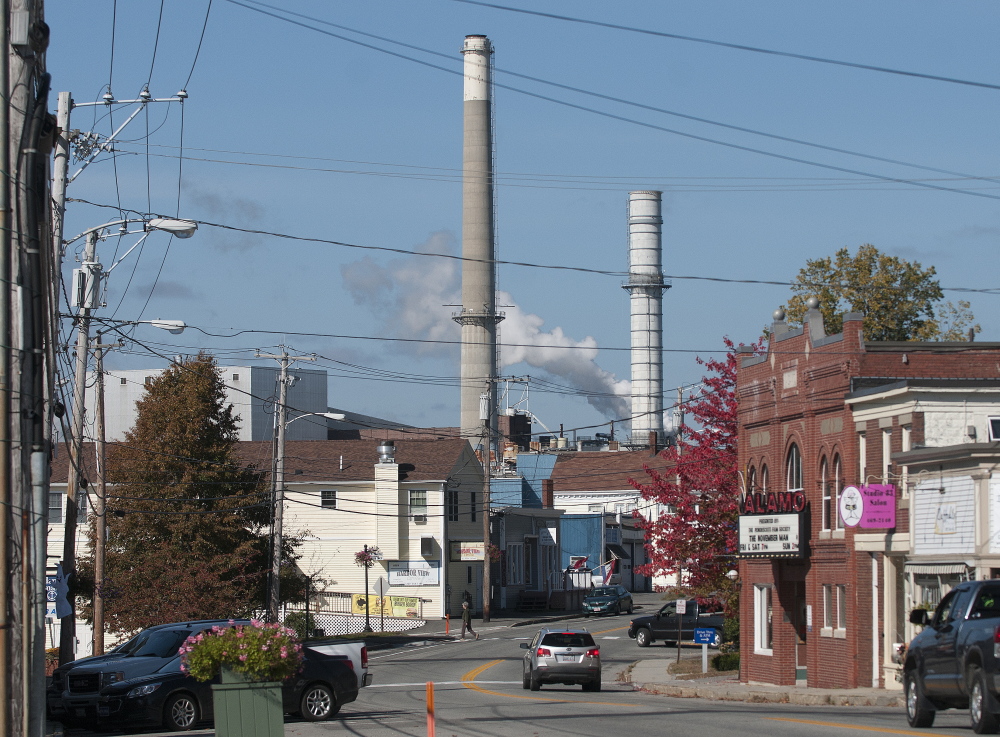The loss of Verso Paper Corp.’s Bucksport plant will be felt all over Maine. Five hundred workers will lose good-paying positions, but that’s just the start of it.
According to the Maine Pulp and Paper Association, every papermaking job directly supports 3.3 jobs for suppliers and contractors, as well indirectly supporting five other jobs in logging, transportation, retail and other fields.
We should expect candidates in the gubernatorial race to try to blame the loss of Verso, the third Maine paper mill to shut down so far this year, on policy mistakes of the past. But what happened in Bucksport is mostly the result of a historic transition in the industry that has been going on before our eyes for decades. The policy mistake has been failing to adequately prepare for this day. Now the discussion should focus on the future, and the kinds of industries that might replace the papermaking jobs that are going away and most likely never coming back.
The Maine paper industry is not, as some people say, in decline, but it is changing rapidly. Maine is producing as much paper and pulp as it ever has, according to industry sources. But it is doing it with far fewer people in the mills and in the woods. Maine mills are in a global competition with producers that are government-subsidized or that pay less for wood or electricity than the ones here do. Maine will not be able to compete on price for every paper product, but it can still be profitable in some lines of business. The industry isn’t going to disappear – it just isn’t going to be the big employer it once was.
And it should be noted that the state did try to help Verso. In 2010, during the Baldacci administration, the company received a $2 million grant from Efficiency Maine to build an energy-efficient biomass and gas generator for its Bucksport mill to lower its energy costs. And Verso received a $10 million tax increment financing deal from the town of Bucksport.
It was one of the biggest receivers of business equipment tax rebates from the state, receiving about $4 million annually through the program.
When Gov. LePage maneuvered to get Maine out of a power-purchase contract with Statoil that was supposed to finance a $120 million experimental offshore wind plant, he said it was necessary to keep Maine’s above-national-average electricity costs from rising so our state could maintain manufacturing jobs for companies like Verso.
Despite all those efforts, the Memphis, Tennessee-based company decided to pull the plug on Bucksport.
Verso makes paper, not jobs, and it has an obligation to its stockholders to do that in the most efficient way possible. Maine policymakers should be fully engaged in creating the conditions for new jobs in other industries that can do for our economy what the paper industry once did.
• First, there should be a recognition that new jobs come from new businesses. It is much more fruitful to help new businesses get off the ground than it is to try to lure a giant employer into the state with tax incentives. Hannaford Brothers, L.L. Bean, Bath Iron Works, Shaws Supermarkets and four hospitals all employ more Mainers than the largest paper company – and all of them started small and started in Maine.
• Mill closures are alarm bells telling us we should invest in education, from pre-kindergarten to graduate school. Maine couldn’t compete for the lowest-cost workforce even if we wanted to, but we should try to compete to be the most-skilled one.
Making sure that young people are prepared for higher education, seeking either a four-year or two-year degree, would mean more to Maine’s future than finding a buyer for the Bucksport mill. The state should also stop scrimping on its university system, which not only educates the workforce but also can be the place where ideas for new enterprises are born.
• And the state should stop playing politics with research and development, like the R&D bond that was vetoed by the governor in 2012. Public funds, properly targeted, get ideas ready for the marketplace. The results can be measured more transparently than the impact of the economic development tax breaks the state now distributes.
Giving existing businesses state money to hold onto jobs is a gamble, as we have seen with Verso and the bankrupt Great Northern Paper Co. A more diverse, innovation-focused investment strategy is a safer bet with the potential for greater rewards.
Millworkers need the state to work with paper companies to hold on to as many of these valuable jobs as possible. But they also need Maine to create the conditions for the success of new businesses to counteract this sad but inevitable transition. The loss of this mill hurts, but failing to plan for the future would hurt even more.
Send questions/comments to the editors.



Success. Please wait for the page to reload. If the page does not reload within 5 seconds, please refresh the page.
Enter your email and password to access comments.
Hi, to comment on stories you must . This profile is in addition to your subscription and website login.
Already have a commenting profile? .
Invalid username/password.
Please check your email to confirm and complete your registration.
Only subscribers are eligible to post comments. Please subscribe or login first for digital access. Here’s why.
Use the form below to reset your password. When you've submitted your account email, we will send an email with a reset code.